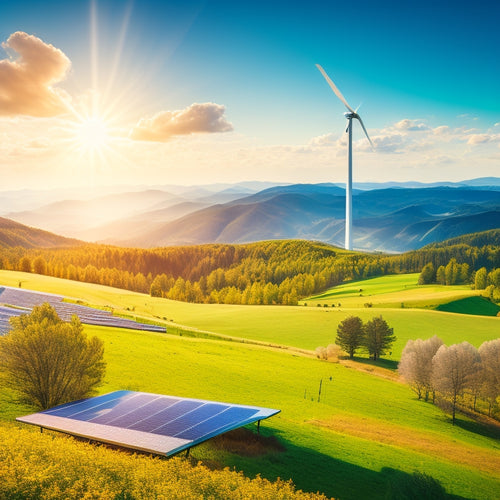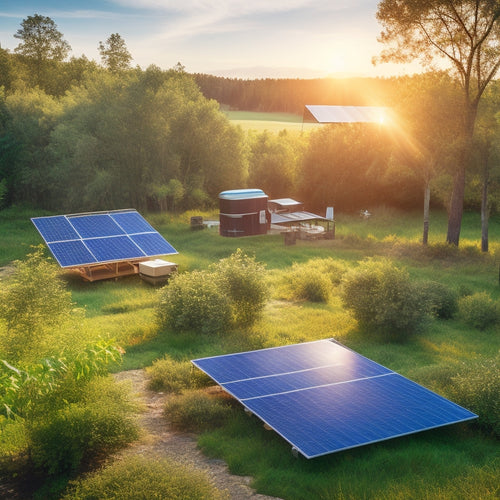
Buying Home Energy Backup Systems: What to Consider
Share
When buying home energy backup systems, consider several key factors. First, assess your power capacity needs by identifying essential appliances and their wattage requirements. Consider the type of system, such as traditional generators or solar backups, each with its benefits and drawbacks. Don't forget to evaluate costs, including initial investment and long-term savings potential. Additionally, think about the lifespan of the system and maintenance requirements, as these can greatly affect your overall expenses. By understanding these elements, you'll be better equipped to select the right system for your home's needs and circumstances ahead.
At a Glance
- Assess critical appliances' energy consumption and total wattage to determine the appropriate backup system size.
- Consider different battery types, such as lithium-ion or lead-acid, based on budget and longevity preferences.
- Evaluate the total cost, including initial investment, potential savings, and ongoing maintenance expenses.
- Ensure the backup system can handle future energy demands by factoring in lifestyle changes and appliance upgrades.
- Review the durability and lifespan of the system to minimize replacements and maintenance over time.
Reliable Power During Outages
When considering reliable power during outages, it's vital to understand the different types of backup systems available to you.
Battery backup systems are designed to guarantee that essential devices continue to operate, providing peace of mind during unexpected disruptions.
Sizing your needs accurately guarantees that your chosen system can support essential appliances and maintain comfort during an interruption.
Evaluating these factors will help you make an informed decision that meets your unique energy requirements, especially considering the significance of maintaining home operations during outages.
Types of Backup Systems
Many homeowners seek reliable power solutions during outages, and understanding the types of backup systems available is essential for making an informed decision. The two primary options are traditional generators and solar backup systems.
Traditional generators, either portable or standby, provide immediate power during outages. They can run on gasoline, propane, or natural gas, but they often require manual operation and can contribute to greenhouse gas emissions. While they're effective, you should consider their noise levels and fuel availability.
On the other hand, solar backup systems are becoming increasingly popular as generator alternatives. These systems utilize sunlight to generate electricity, offering a clean, renewable option for backup power. They typically include solar panels and batteries, allowing you to store energy for use during outages.
While solar systems may require a higher upfront investment, they can lead to long-term savings and energy independence.
Ultimately, choosing the right backup system depends on your energy needs, budget, and commitment to sustainability. Evaluating these options will enable you to make a choice that aligns with your values and lifestyle.
Sizing Your Needs
Sizing your energy needs is crucial for guaranteeing reliable power during outages. To determine the right backup system for your home, start by evaluating your critical appliances and their energy consumption.
List everything you want to power during an outage—refrigerators, heating systems, lights, and electronics—and check their wattage requirements. This helps you gauge how much power you'll need.
Next, consider energy efficiency. Upgrading to energy-efficient appliances can greatly reduce your power demands. If you invest in such appliances, you'll not only lower your overall energy needs but also enhance your system's performance during a power outage.
Additionally, verify system compatibility. Your backup energy system should seamlessly integrate with your existing electrical setup, including circuit breakers and any renewable energy sources you may have.
This compatibility guarantees that your backup system works effectively without causing disruptions or hazards.
Cost Savings Over Time
When considering a home energy backup system, it's essential to weigh the initial investment against potential long-term savings.
Home battery backup systems can lead to reduced monthly energy costs, particularly through increased grid independence and optimized energy consumption.
You'll also need to factor in maintenance and operating costs, as these can impact your overall financial landscape.
By analyzing these elements, you can make an informed decision that aligns with your budget and energy needs.
Additionally, understanding financial considerations will also play an important role in your decision-making process.
Initial Investment vs. Savings
Investing in a home energy backup system involves evaluating the initial costs against potential long-term savings. While the upfront investment may seem considerable, understanding the financing options available can ease this burden. Many companies provide flexible payment plans or financing arrangements that allow you to spread the cost over time. This makes the shift more manageable while still providing the benefits of energy independence.
When considering your return on investment, think about how much you'll save on energy bills and potential power outages. Backup systems can greatly reduce reliance on grid electricity, especially during peak usage times when rates are higher. Additionally, by generating your own power, you can avoid fluctuating energy costs, creating a stable financial environment for your household.
As you evaluate your options, calculate not just the initial price but also how long it'll take to recoup that cost through savings. A well-chosen backup system not only enhances your energy security but can also lead to considerable savings over time, making it a financially sound decision for those seeking freedom and autonomy in their energy choices.
Maintenance and Operating Costs
Once you've assessed your initial investment and anticipated savings, it's important to factor in the ongoing maintenance and operating costs of your home energy backup system. These costs can greatly impact your overall financial landscape and should guide your decision-making.
Regular maintenance is important for ensuring your system operates efficiently. This may include routine inspections, battery replacements, or software updates.
While some manufacturers offer warranty options that cover specific repairs or replacements, understanding what's included is critical. A solid warranty can save you money on unexpected repairs, but it's necessary to read the fine print.
You'll also want to contemplate potential system upgrades as technology evolves. Investing in newer components can enhance efficiency and performance but may incur additional costs.
Always evaluate how these upgrades align with your long-term goals and budget.
Key Specifications to Review
When selecting a home energy backup system, understanding key specifications is essential.
You'll want to assess your power capacity requirements to guarantee the system meets your energy needs during outages.
Additionally, consider the different battery type options available, as they can greatly affect performance and longevity.
For instance, lithium-ion batteries are often preferred due to their higher efficiency and longevity, making them a reliable choice for homeowners seeking top battery brands.
Power Capacity Requirements
Understanding power capacity requirements is vital for selecting the right home energy backup system. You'll want to assess your household's energy needs to guarantee that the system can handle your load effectively. Start by identifying the important appliances you need to power during an outage, such as refrigerators, heating systems, or medical equipment.
Next, calculate the total wattage required for these devices. This figure will guide you in choosing a backup system with adequate capacity. Remember that energy efficiency plays a significant role here. A system that optimizes energy use can extend backup time and reduce operational costs.
You should also consider load management strategies. By prioritizing which appliances to power, you can maximize the effectiveness of your backup system. This means you can run essential devices without overloading the system, guaranteeing it operates smoothly during emergencies.
Ultimately, understanding your power capacity requirements allows you to make informed decisions about your home energy backup system, giving you the freedom to maneuver through unexpected power outages with confidence.
Battery Type Options
Choosing the right battery type for your home energy backup system requires careful consideration of key specifications. The two most common types are lithium-ion and lead-acid batteries, each with distinct characteristics that can impact your energy independence.
| Specification | Lithium-Ion | Lead Acid |
|---|---|---|
| Lifespan | 10-15 years | 3-5 years |
| Depth of Discharge | 80-90% | 50% |
| Efficiency | 90-95% | 70-80% |
Lithium-ion batteries offer a longer lifespan and higher efficiency, making them a popular choice for those who prioritize reliability and performance. They can be discharged deeper without damaging the cells, which maximizes their utility during outages. However, they typically come at a higher initial cost.
On the other hand, lead-acid batteries are more affordable upfront but have a shorter lifespan and lower efficiency. They're a dependable choice for those on a budget or who don't require frequent deep discharges.
Ultimately, the decision hinges on your specific energy needs, budget, and willingness to invest in long-term solutions. Consider these specifications to enhance your home energy strategy.
Assessing Power Capacity Requirements
To effectively assess your power capacity requirements, you need to determine your energy needs based on your household's usage patterns.
Start by evaluating which appliances are essential during a power outage and how much energy each consumes. This analysis will guide you in selecting a backup system that meets your specific requirements without overspending.
Additionally, understanding your energy consumption patterns can help identify inefficiencies and optimize your energy usage.
Determine Energy Needs
Many homeowners underestimate the importance of accurately determining their energy needs when considering a backup power system. Understanding your energy consumption is vital for selecting a system that provides reliable power during outages.
Start by evaluating the wattage requirements of essential appliances, including refrigerators, HVAC units, and lighting. This assessment will help you identify the total power capacity you'll need from your backup system.
Next, consider how long you might need to rely on your backup system during a power failure. This includes factoring in the average duration of outages in your area and your lifestyle preferences. You want a system that not only meets your immediate power needs but also guarantees backup reliability over extended periods.
Don't forget to factor in potential future energy demands. As you adopt more energy-intensive devices or appliances, your energy needs may change. Consequently, it's wise to choose a backup power system that can accommodate increased consumption without compromising efficiency.
Evaluate Appliance Usage
When evaluating appliance usage, it's vital to take into account the specific power capacity requirements of each device you'll want to keep running during an outage. Start by listing all important appliances, such as refrigerators, heaters, and medical equipment. Check their energy consumption ratings, typically found on labels or in the user's manual. This gives you a clear idea of how much power each appliance requires.
Next, consider appliance efficiency. Some devices consume less energy than others, which is significant when you're trying to maximize your backup system's performance. High-efficiency appliances can provide necessary services with lower overall energy consumption, allowing you to extend the runtime of your backup system.
Don't forget to factor in the starting wattage for appliances with motors, like refrigerators or air conditioners, which can draw considerably more power upon startup.
Longer Lifespan Than Generators
When considering home energy backup systems, you'll find that they often outlast traditional generators.
This increased durability not only results in fewer replacements but also translates to lower maintenance costs over time.
Durability and Maintenance Costs
Investing in home energy backup systems offers not only reliability during power outages but also greater durability and lower maintenance costs compared to traditional generators. One of the standout features of these systems is their impressive system longevity. Unlike conventional generators that often require frequent replacements and repairs, modern backup solutions are designed to endure the test of time, minimizing your long-term costs.
When considering durability, it's crucial to look at the materials and technologies used in these systems. Many are built with sturdy components that resist wear and tear, leading to reduced maintenance frequency. This means you won't have to worry about constant servicing, which can be both time-consuming and costly.
Additionally, many home energy backup systems come equipped with advanced monitoring features that detect issues before they escalate, further reducing the need for maintenance. This proactive approach not only enhances reliability but also gives you peace of mind, knowing your system is working efficiently.
Ultimately, selecting a durable home energy backup system allows you to enjoy energy independence without the burden of high maintenance costs, ensuring you can focus on what truly matters—your freedom and comfort.
Frequently Asked Questions
What Types of Energy Backup Systems Are Available?
When exploring energy backup systems, you'll encounter various battery types like lithium-ion and lead-acid, along with fuel options such as propane and natural gas. Each choice impacts efficiency, capacity, and suitability for your needs.
How Do I Determine the Best Location for Installation?
To determine the best installation space, evaluate environmental factors like sunlight and wind, consider accessibility for maintenance, and check noise restrictions to guarantee your system operates efficiently without disturbing your living environment.
Can I Integrate a Backup System With Solar Panels?
You can seamlessly integrate a backup system with solar panels, enhancing solar panel compatibility and maximizing energy storage options. This combination enables you to utilize renewable energy, ensuring you're prepared for outages while reducing dependency on the grid.
What Maintenance Is Required for Energy Backup Systems?
Maintaining your energy backup system involves regular checks on battery health and performing load testing. You'll guarantee peak performance and longevity, helping you achieve energy independence while minimizing unexpected outages and costly repairs.
Are There Any Warranties or Guarantees Available?
Yes, there are warranty options and guarantee coverage available for energy backup systems. You should carefully review each manufacturer's terms to ascertain you get the best protection for your investment and peace of mind.
Explore More
To sum up, when considering a home energy backup system, prioritize reliability, evaluate costs, and assess power capacity. By investing in a system that offers dependable power during outages, potential savings over time, and a longer lifespan than traditional generators, you're making a smart choice for your home. In this way, you not only enhance your energy security but also contribute to a more sustainable and efficient future for your household.
Related Posts
-

Renewable Energy Solutions to Reduce Your Carbon Footprint
To reduce your carbon footprint, adopting renewable energy solutions is key. Using solar panels or wind turbines can ...
-

Top Off Grid Solar Batteries for Renewable Energy
When seeking top off-grid solar batteries for renewable energy, consider options with advanced battery chemistry, suc...
-

High-Efficiency Solar Battery Chargers for Remote Areas
High-efficiency solar battery chargers are essential for your off-grid energy needs in remote areas. They maximize en...


